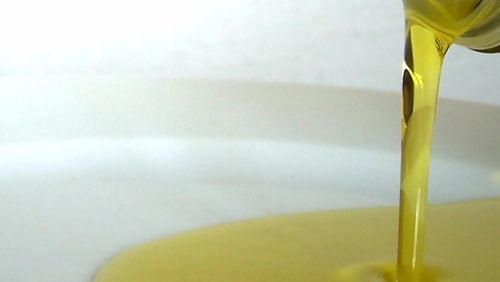Back in the late 1990s, a group of Texas cattle ranchers sued Oprah Winfrey for claiming on her syndicated talk show that she’d never eat a hamburger again for fear of contracting Mad Cow disease.
Now, her protege Dr. Mehmet Oz, may be following in her footsteps over olive oil.
The North American Olive Oil Association filed a lawsuit in Fulton County Superior Court this week against Oz claiming that he’d made “disparaging statements,” about the purity of olive oil sold in the United States.
Michael Kohler, an Atlanta attorney representing the industry, declined comment on the lawsuit Wednesday. There was no immediate response from Oz’s production company.
Georgia is one of thirteen states that has what’s known as a food libel law, which has a lower threshold of proof than a defamation allegation. According to the Georgia statute, food libel occurs when someone tells the public that a “perishable food product or commodity is not safe for human consumption,” and that the comment is not based on “reasonable and reliable scientific inquiry, facts, or data.”
Winfrey was sued under a Texas version of the act back in 1997 after she made her comments about beef. The cattlemen claimed they lost millions after the segment aired. A Texas jury found Winfrey did not act with malice or cause harm to the industry.
Oz finds himself pressed with similar charges, this time by the olive oil trade association.
According to the the suit, during a May 12 episode of “The Doctor Oz Show,” Oz had a guest from a private olive farm in California discussing kinds of olive oil. During the show, Oz is quoted as saying, “[A] shocking 80 percent of the extra virgin olive oil that you buy every day in your supermarket isn’t the real deal. It may even be fake.” According to the complaint, he went on to say “it probably contains less actual olive oil than you ever imagined. It’s likely been mixed with artificial colors and less expensive oils.”
The lawsuit claims Oz, “willfully and maliciously disseminated to the public…false information about olive oil coming from places other than California,” and that his comments wasn’t based on scientific facts or data. The agency is seeking unspecified damages.
Several news outlets, including “60 Minutes” have investigated the issue of olive oil purity. The news magazine reported that between 75 percent to 80 percent of olive oil sold in the United States was not extra-virgin olive oil as it was labeled, and could contain other oils.
The suit, as well as the product investigations, center on imported olive oil. Domestically, Georgia is one of the nation’s olive oil producers, although a small one. Jason Shaw is president of Georgia Olive Farms and a board member of the American Olive Oil Producers Association. His sprawling farm near Valdosta has been the subject of numerous profiles in the food press since it harvested its first crop of olives five years ago. In 2013 the Wall Street Journal included Georgia Olive Farms’ oil in it’s top 10 domestic oils calling it an “excellent, everyday oil.”
Shaw had not heard of the Oz lawsuit, and said he is not party to it. He was familiar, however, with the onslaught of press scrutiny heaped on the imported olive oil industry and the claims of adulteration.
“I don’t know if Dr. Oz did his homework or not but there are issues, not only in the U.S. but in Italy,” Shaw said.
The U.S. produces about 3 percent of the olive oil consumed in the country, he said, though the AOOPA places it at 2 percent. His oils come from his farm in Lakeland, Georgia and from growers north Florida and California. It’s not just Oz who will be affected by the lawsuit, but the consumer, Shaw said.
“The consumer is the one getting shorted because they are not getting the health benefits they think they are if they are buying an adulterated product,” Shaw said.







